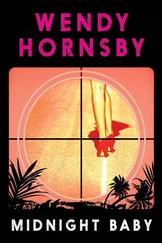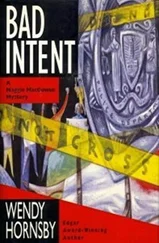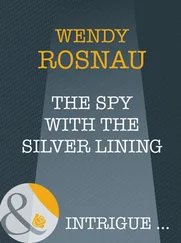“He was the driver?”
“No, dear. That’s the name of the man who was arrested, the rapist. Ennis Jones.”
Walking away from Gracie’s, I dialed Kevin’s mobile phone.
“Detective Halloran,” he answered, though I knew my name came up on his caller I.D.
“You’re busy,” I said.
“Go ahead,” was his cryptic response.
“Gracie Nussbaum picked out something interesting on the film I showed you,” I said. “I thought you should know.”
“What was it?” Someone in the room with him, a woman, wanted to know who he was talking to. He shushed her.
“It was the wrong day for the dry cleaner’s van to be on our street.”
“That’s a tough one,” he said. “But I’ll check it out. Anything else?”
“Yes, but it can keep. Sounds like you’re in a meeting.”
“This is as good a time as any.” The woman volubly disagreed. “Go ahead.”
“Do you remember Toshio Sato?”
“The gardener?”
“Yes,” I said. “He told me that he’s caught Larry Nordquist hanging out in Mom’s backyard a couple of times.”
“Larry? At your mom’s house?” Again he shushed the woman when she demanded to know whose mom. “What was he doing there?”
“Hanging out, apparently,” I said. “Mr. Sato called the police last week. But Larry showed up again today.”
“Were you there?”
“I was.”
“What did he do?”
“Nothing, really. Mr. Sato shooed him away,” I said. “You told me Larry was out on parole. What did the police do with the call?”
“I’ll check it out and get back to you.”
“Thanks,” I said. “Sorry to interrupt.”
It was a beautiful day, and it was nice to be outdoors. Instead of going straight home, I walked across the western end of campus and went into town. I had missed breakfast and lunch, unless you count one rugelach. I was hungry, there was nothing at home except garden vegetables to eat, and I wanted to see Beto. Not to tell him about the film-I wasn’t ready for that yet-but just to spend a few minutes with my old friend.
Bartolini’s Deli and Italian Market on Shattuck Avenue was busy, as always. Located half a block from the BART station, about equidistant between the Civic Center and the massive Cal campus, even at two o’clock in the afternoon there were seven people ahead of me when I pulled a number tab from the machine on top of the refrigerated deli cases.
Beto was hard at work behind the counter, serving customers and supervising three young clerks, sending orders to the kitchen, overseeing plates coming out of the kitchen, slicing and wrapping meats and cheeses as ordered, dishing up take-out containers of salads and casseroles and precooked entrees. He was so busy that I gave up on any notion of having any sort of chat with him. But I was still hungry.
When he noticed me he flashed me his big smile and called out, “Hey, Maggie.”
“Hi, Beto.” I gave him a little wave, took a bottle of cold water out of a drinks cooler, and found a table near some freestanding metal racks filled with imported pastas and delicacies and waited for my number to come up on the board.
While I was waiting, Kevin called. Without preliminaries, he said, “Patrol officers responded to Mr. Sato’s call. Larry was picked up and brought in. He was released to his probation officer, but it was Father John who picked him up.”
“Father John?” I said. “Our Father John? I thought he had gone off to Outer Upper Gadzookistan or somewhere.”
“He’s back in the parish,” Kevin said, followed by “I have to go.”
I thanked him, wondering about his abrupt tone. Something was up with him.
“Yo, is that my favorite TV lady?” Old Bart Bartolini, Beto’s dad, came out from the kitchen when he spotted me. He kissed me on both cheeks. “Beto said you was in town.” He lowered his chin. “Sorry to hear about your mother, honey. Betsy was one nice lady.”
“Mom is fine,” I said. “She moved down closer to me so you won’t be seeing as much of her, but she’s just fine.”
He furrowed his brow, seemed confused; we’d had exactly the same conversation two days earlier.
“I thought you retired,” I said, shifting the topic. “So why are you wearing that big apron?”
“Just helping out the boy,” he said, sitting down heavily in the chair beside mine, grimacing as if his feet hurt. “You know, only till Beto gets the hang of running the place.”
“Seems to me he’s doing just fine.” No need to remind him that Beto had worked in the store for most of his life.
Mr. Bartolini beamed as he looked over at his son. He could behave like an old curmudgeon with his employees and with overly demanding customers, but where Beto was concerned, there was nothing but sweetness and light.
“What a kid, uh?” He pulled a towel off his apron string, picked up my sweating water bottle and wiped the table under it. “Always a good worker, that one. I just wish his mom…”
His eyes filled, just as they had two days earlier, when he’d said exactly the same thing.
Mr. Bartolini was somewhere in his eighties. When he moved to Berkeley about forty years ago and opened his deli, he was a retired navy cook with a much-younger Vietnamese bride and a baby boy. If Beto was the apple of his eye, his wife, Tina, was the entire apple orchard. I could only imagine the pain her death inflicted on him. On both of them.
When I lost my husband, Mike, to cancer a little over a year ago, it felt as if the San Andreas fault had opened up and swallowed me whole. I would have given anything for a little more time with him. But Mike decided for himself when he’d had enough, and left this world on his own terms at a time of his own choosing. As much as I missed him, I accepted his decision. But someone else, a stranger maybe, had made that decision for Tina Bartolini. And that was not fair.
Mr. B took a deep breath and looked up at me from under his thicket of eyebrows.
“Everyone’s sure gonna miss your mom,” he said, patting my hand. “She was one of the finest ladies I ever knew. You know, when she first met my Tina, I thought there might be some, ya know, resentment, her being Vietnamese and your big brother dying over there.”
“My parents would never associate Mrs. B with what happened to my brother.”
“Yeah? Well some people did. Gave her a hard time.”
“I’m sorry to hear that,” I said.
“But not your mother. She helped Tina get registered in some English classes over at the JC. Then when the war over there went all to hell and refugees poured into this area, your mom hooked her up to the refugee assistance programs. You know, to help people coming in from Vietnam to get what they needed.” He began to choke up again. “That was real important to my wife. Being able to help out like that.”
During the entire conversation, Beto kept an eye on his father. When Mr. Bartolini reached a certain emotional state, Beto handed off the customer he was serving to one of his staff and joined us. He wrapped an arm around his father’s shoulders and leaned down close.
“How you doing, Papa?”
“Good. Good.” Mr. Bartolini wiped his eyes with the backs of his big hands and gave his son a game smile. “I was telling Maggie how sorry we were to hear she lost her mother.”
Beto kissed his father on the forehead, gave me a watcha-gonna-do? look. I smiled. There was no point correcting Mr. Bartolini, again.
Mr. B turned to me. “You should try Beto’s pastrami today. It’s extra special.”
“My pastrami is always extra special, Papa.” Beto had been a sweet, round-cheeked little boy. He had become a sweet, round-all-over adult, very much like his dad, except with his mother’s soft brown slanted eyes and none of Mr. B’s curmudgeonly edges. “But you talked Maggie into having the pastrami day before yesterday. Today I have some really nice baked ziti with chicken, artichokes, some asparagus and good Greek olives. I think she’ll like it.”
Читать дальше












